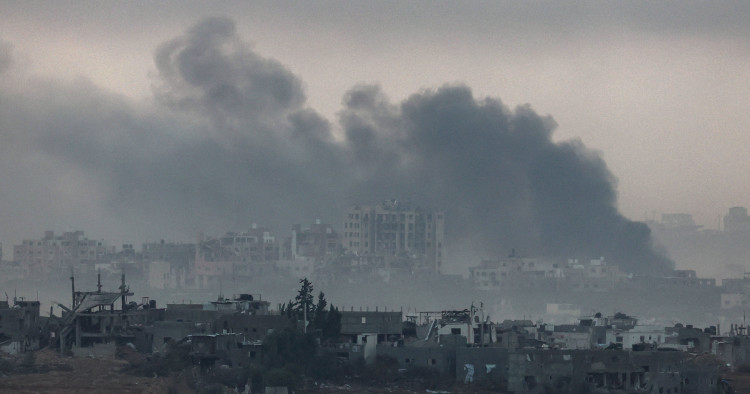Note: The Monday Briefing will be taking a hiatus starting this week. We will resume publication in January 2024.
Contents:
- Partners in war, opponents in peace: The US and Israel are fighting different wars
- Israel is running out of time to fulfill its war aims
- Truce does little to improve Gaza humanitarian crisis, while Israel’s deficient military strategy can only increase devastation
- Biden administration neglects to reconcile tensions within its policy responses to Israel-Hamas war
- COP28 start off with a landmark agreement on loss and damage
- Turkey: Swagger amid isolation
- ICC prosecutor’s selective engagement in Israel and Gaza raises concerns
Partners in war, opponents in peace: The US and Israel are fighting different wars
Paul Salem
President and CEO

-
The U.S. and Israel both want to see Hamas destroyed; but while Prime Minister Netanyahu’s government is waging this war to re-subjugate Gaza and consolidate Israel’s occupation over the West Bank, President Biden says his political endgame is to move forward on a two-state solution.
-
Washington should be aware of this profound strategic divergence and use its influence now to message Israeli public opinion in a manner that begins to shape and direct events toward the latter direction not the former.
If war is the continuation of politics by other means, then the Israeli and U.S. governments are engaged in two radically different wars. They both agree on the goal of destroying Hamas — whether that will prove possible or not is another matter. But Prime Minister Benjamin Netanyahu and his extreme-right-wing allies are seemingly waging this war to establish a renewed occupation or other form of subjugation over Gaza as well as to consolidate Israel’s decades-long occupation over the West Bank, whereas, President Joe Biden says his political endgame for this war is not to return to a reinforced version of the status quo ante but rather to move forward on a two-state solution. The United States should be aware of this profound strategic divergence and use its influence now to message Israeli public opinion — which is much broader and more diverse than Netanyahu and his right-wing allies — in a manner that begins to shape and direct events toward the latter direction not the former.
Many Israelis realize that the status quo ante, which Netanyahu had largely engineered, is no longer viable as a long-term strategy; but they are also so enraged by the attacks of Oct. 7 that they cannot currently imagine peace with their Palestinian neighbors. In turn, many influential Arab countries that were moving toward normalization with Israel cannot currently imagine proceeding rapidly down that path without the current war ending, and without a positive turn toward negotiations and the provision of something substantial for the Palestinians under a revamped Palestinian Authority. Every crisis presents an opportunity, and many wars often present opportunities for breakthroughs to peace. World War II created the conditions for the emergence of the European Union; the 1973 war led to Israeli-Egyptian peace; and the First Gulf War and First Intifada led to the Madrid peace process and the Oslo Accords.
The U.S. remains the strongest player in this arena. So far, the Biden administration has chosen the easier path: supporting Israel’s war effort while urging protection for civilians and, to date, paying only lip service to an eventual peace effort toward a two-state solution. Rather, President Biden should proceed more boldly to call for and set a date in early 2024 for an international conference on Israeli-Palestinian peace as well as begin deploying America’s considerable diplomatic and political influence, with both global and regional players, to bring it about. Unless Washington is clear and firm in shaping the political outcome of this war, it will be simply enabling a dead-end project in which the latest conflict digs a deeper hole for both Israelis and Palestinians — an outcome that arguably would suit Hamas, Iran, and other extremists and spoilers against peace just fine.
Follow: @paul_salem
Israel is running out of time to fulfill its war aims
Eran Etzion
Non-Resident Scholar

-
Israel’s regional and global partners and allies, first and foremost the U.S., are losing patience and whatever faith they had in the ability of Prime Minister Benjamin Netanyahu’s government to come up with a credible “day after” plan.
-
Barring any low-probability, high-impact events, the fighting will likely be halted in the near future with Israel’s war goals still out of reach, for which Netanyahu will blame the U.S. administration, the Europeans, the Israeli “left,” and the international and national media.
The Israel-Hamas war in Gaza has now raged on for almost 60 days, with arguably no end in sight. The temporary pause in active hostilities, reached via intense negotiations and the mediation of Qatar, the United States, and Egypt, succeeded in freeing 81 Israeli hostages and another 24 foreign nationals. Crucially, the agreed mechanisms at the heart of this agreement — detailing the “exchange rate” of Palestinian prisoners in Israel to Israeli hostages in Gaza (3 to 1), the amount of humanitarian aid entering Gaza, and the rules of disengagement between the two sides — will probably serve in the near future as a basis for further such hostages-for-prisoners deals. The Israeli government is sparing no media efforts to hammer its claim that the only reason Hamas agreed to the deal was the Israel Defense Forces’ (IDF) fierce military pressure. However, according to various credible reports, a very similar or even identical deal was offered by Hamas as early as mid-October.
Be that as it may, the pause started to break down two days earlier than agreed, and fierce fighting resumed in earnest by Friday, Dec. 1. Israel now faces a growing de-synchronization between its various timetables — military, diplomatic, economic, and the all-to-familiar to American ears rush to win “hearts and minds,” i.e., the battle for legitimacy among and future cooperation from the local population, regional powers, and allies. While the military effort needs at least a few months to achieve its stated goal of “eliminating Hamas’ military and governmental capabilities,” the diplomatic clock has been recalibrated. Due to the immense human and physical devastation in Gaza, it is now ticking more quickly and is expected to run down in December or January. Israel’s regional and global partners and allies, first and foremost the U.S., are losing patience and whatever faith they had in the ability of Prime Minister Benjamin Netanyahu’s government to come up with a credible “day after” plan. Worst still, in the battle for hearts and minds, Israel is rapidly losing ground, not only in Europe but also in the U.S. And the economy is taking a severe short- and medium-term blow.
Things may still change, with a low-probability, high-impact event such as the decapitation of Hamas’ leadership or a surprise surrender by the Islamist organization. But in all likelihood, the fighting will be halted with Israel’s war goals still out of reach. What might very well develop is the all too familiar blame game, with Netanyahu pinning culpability on the U.S. administration, the Europeans, the Israeli “left,” and the international and national media. Of course, the political implications of such a campaign during a U.S. election year are deeply embedded in Netanyahu’s calculus. But his primary concerns remain Israeli domestic politics and his desperate maneuvers to remain in office, despite some 75% of Israelis wishing for him to resign, either right away or immediately upon the end of active warfare. Meanwhile, deep beneath Gaza, spread throughout its 600-kilometer-long web of tunnels, Hamas’ leadership is fully aware of all of this. The strategy of Hamas’ Gazan chief, Yahya Sinwar, is survival. Having lost an estimated 10-20% of its fighting force of 30,000, the militant group might just be able to run down Israel’s war clock and avoid destruction. Israel needs a new strategy, but its current government is not willing or able to produce it.
Follow: @eranetzion
Truce does little to improve Gaza humanitarian crisis, while Israel’s deficient military strategy can only increase devastation
Nasir Almasri
Graduate Fellow, Program on Palestine and Palestinian-Israeli Affairs

-
A temporary truce did relatively little to provide aid to Palestinians, as access to health, fuel, and sustenance remains extremely limited and the situation is increasingly dire.
-
Israel remains without a clear military strategy in Gaza, and its intense bombing campaign will only worsen the humanitarian catastrophe, as the U.S. presses it to make progress more quickly.
While Palestinians welcomed a seven-day pause in Israel’s intense bombardment of the Gaza Strip, last week’s truce did little to improve the humanitarian situation. According to the United Nations, 500 aid trucks per day were needed to sustain life in Gaza even before Oct. 7. The destruction caused by the ensuing war has sharply increased that need; yet only a small fraction of the necessary aid entered the strip prior to the truce, and only 200 trucks per day were able to enter during it. Israel refused requests by the Biden administration to continue permitting 200 trucks per day after hostilities resumed.
The lack of aid has further exacerbated an already catastrophic situation: Israeli bombing has decimated Gaza’s health infrastructure, and its orders to evacuate hospitals led to what the World Health Organization (WHO) called a “death sentence” for sick and injured Palestinians, including newborn babies. The war’s devastation has been so vast that the medical aid that entered Gaza during the week-long truce was “only enough for one day.” Moreover, the struggle to find food and water has heightened in Gaza as “surviving has become a full-time, perilous undertaking.” The United Nations described the situation as a “humanitarian tsunami.”
The humanitarian catastrophe will only sharpen as Israel remains without a clear military strategy in Gaza, seemingly hoping that the worsening humanitarian situation will reduce Hamas’ support and capacity. To date, Israel has killed 15,500 Palestinians (70% women and children), wounded over 40,000 others, and displaced 1.8 million Gazans. To make matters worse, the WHO warns that the spread of disease in Gaza could cause more death than the bombing.
In a turn of events, the United States signaled that time is not on Israel’s side. U.S. Secretary of State Anthony Blinken warned Israel that it has weeks — not months — to prosecute its war against Hamas as a consequence of increased international and domestic pressure on Washington to hold Israel accountable. The U.S. also acknowledged the humanitarian consequences of Israel’s war on Gaza and insisted, as war resumes, that Palestinian civilians must be protected in accordance with international law. Unless Israel hones its military strategy in the coming weeks, it may continue to resort to relying on devastation and destruction as a means to win an otherwise unwinnable war.
Follow: @Nasir_Almasri
Biden administration neglects to reconcile tensions within its policy responses to Israel-Hamas war
Brian Katulis
Vice President of Policy

-
The renewed conflict after the collapse of a week-long ceasefire highlights the contradictions within the Biden administration’s strategy.
-
As U.S. calls for restraint and limited actions at deterrence are ignored, the region steps closer to the brink of a wider escalation.
A gaggle of senior Biden administration officials fanned out across the Middle East and in the media to make statements aimed at de-escalating the conflict between Israel and Hamas and getting hostage talks back on track. Yet those efforts were to no avail as the week-long-cease-fire collapsed in Gaza and tensions continued to rise across the region due to attacks by Iran’s regional proxies.
Vice President Kamala Harris and Secretary of State Antony Blinken traveled to the region late last week, following up on the quick trip by Central Intelligence Agency (CIA) Director William Burns earlier in the week. All of these visits were aimed at “putting diplomacy first” in seeking a pathway for the release of more hostages, including several U.S. citizens who remain either detained or missing in Gaza. Harris and Blinken also both attended the 2023 United Nations Climate Change Conference (28th Conference of the Parties, COP28), hosted by the United Arab Emirates, in an effort to move forward a proactive agenda on climate change; but the urgent crisis of the war continued to intrude.
Harris did her best to present the administration’s fuzzy vision for the post-war situation and engage Middle Eastern partners in discussions on this issue. But Blinken and Burns failed to achieve a long-term extension of the cease-fire due to complications in the hostage negotiations and the fact that the two main combatants in this conflict have fundamentally incompatible goals that seem difficult to reconcile through diplomacy.
In addition, Israel’s military offensive now targeting southern Gaza appears to have ignored public entreaties by Secretary Blinken and Defense Secretary Lloyd Austin to take greater care in its operation to protect civilians in Gaza. Austin even went so far as to warn that Israel risks “strategic defeat” if its military operations fail to keep innocent Palestinians safe. Austin issued this warning at the same time that America and many of its partners across the Middle East continued to see a surge in attacks and threats against them coming from Iran’s regional network of proxies.
In the bigger picture, the Biden administration has neglected to reconcile some fundamental tensions that exist between the various stated aims of its policy response to the Israel-Hamas war. The Biden administration is currently trying to achieve five goals at the same time:
-
Support Israel’s self-defense and objective of eliminating threats posed by Hamas and other militant groups;
-
Secure the safe return of hostages and American citizens trapped in Gaza;
-
Prevent a wider regional war;
-
Protect civilians and respond to a growing humanitarian crisis in Gaza; and
-
Build a network of partners in the region that can help with post-war planning and reconstruction.
The United States has only seen limited and mixed progress toward achieving those goals, and much of that is due to the nature of this conflict and the broader situation in the Middle East. But it is also due to the fact that the Biden administration didn’t appear prepared for this crisis after de-prioritizing the Middle East during its first two years in office, which helps explain how it is now stuck in reactive crisis management mode, beholden to events more than it is shaping them.
One thing the Biden team could do is develop diplomatic mechanisms to work more closely with its partners in the Middle East, and it could also step up its actions to deter those forces across the region seeking to prolong and widen the conflict. There are no simple solutions or clear pathways forward, but a deeper engagement is necessary, and actions speak louder than words.
Follow: @Katulis
COP28 start off with a landmark agreement on loss and damage
Andrei Covatariu
Non-Resident Scholar

-
This pivotal accord aims to support the most vulnerable regions globally that bear the brunt of climate change as they deal with the impacts that have not or cannot be addressed through mitigation or adaptation.
-
While the agreement is a landmark, the operational details will be critical, including key aspects relating to the disbursement of funds and the criteria for absorption.
The first day of the 2023 United Nations Climate Change Conference (28th Conference of the Parties, COP28) in Dubai, in the United Arab Emirates, marked a significant milestone with a highly anticipated agreement on “loss and damage.” This pivotal accord aims to support the most vulnerable regions globally that bear the brunt of climate change.
The term loss and damage is associated with the assistance required for dealing with the impacts of climate change that have not or cannot be addressed through mitigation or adaptation strategies. These needs have continued to escalate, as highlighted by the Intergovernmental Panel on Climate Change in its 2022 report, despite intensified adaptation and mitigation efforts.
Some 30-odd years after the initial discussions on compensation for climate change damages and 15 years after COP13 in Bali, Indonesia, when the concept was first debated, the framework has finally gained momentum. The process received a major boost last year, in Sharm el-Sheikh, Egypt, when COP27 concluded with an agreement to establish a dedicated fund for loss and damage for nations grappling with the effects of climate change.
Though the conversation has evolved slowly since then, the first day of COP28 witnessed a formalized agreement on loss and damage, coinciding with the initiation of support pledges from developed economies. The initial days of the funding process saw pledges reaching the hundreds of millions of dollars, including $100 million each from the UAE and Germany, with additional support from other developed nations.
While this agreement is a landmark, considering both the urgent need to address vulnerabilities and the time it has taken to reach this point, the operational details of this framework are crucial, including key aspects relating to the disbursement of funds and the criteria for absorption.
The world’s attention remains focused on Dubai and much more will need to be done on the climate financing front before COP28 concludes on Dec. 12.
Follow: @AndreiCovatariu
Turkey: Swagger amid isolation
W. Robert Pearson
Non-Resident Scholar

-
With recent statements and actions President Erdoğan has demolished ties with Israel, courted Iran, damaged relations with Germany and the EU, and further alienated Congress.
-
Turkey now finds itself isolated, having offended nearly everyone and influencing no one to forge a path to a better future for the Middle East.
President Recep Tayyip Erdoğan in recent days has undermined Turkey’s security, leaving a trail of diplomatic destruction in Europe, the Middle East, and the North Atlantic Treaty Organization (NATO). First, he jumped from a moderate offer to mediate the Israel-Hamas conflict to praising Hamas as a liberation movement. In contrast to Arab Middle East states, he cultivates Iran, calling for a “united stand” against Israel’s “brutality.” Second, in response to German Chancellor Olaf Scholz’s warm congratulations for his electoral victory in May and invitation to visit Germany, he taunted Germany over its Holocaust history while in Scholz’s presence in Berlin. Third, he has resumed slow walking Sweden’s NATO entry request, squeezing new tension out of a supposedly settled issue. Lastly, despite frequent past sanctions on Turkish companies aiding Hamas and Russia, U.S. Treasury officials were back in Ankara last week to point out new infractions, promising unilateral action if necessary.
The damage from all these actions is evident. Turkey has demolished all ties with Israel. Erdoğan has insulted the Germans to their faces, weakening relations with the European Union. He acts still as the demandeur in the F-16 deal, further alienating Congress and whatever support Ankara retains there. Playing to the Arab street, he complicates Arab government efforts to contain the strife. The Arab states do not appreciate guidance from their former colonial master, Turkey, on how to manage their affairs, especially when it comes to colonialism and liberation movements. Sanctions evasion highlights a scofflaw attitude that dampens investment and growth.
There are two glaring ironies in Ankara’s actions. First, the opening to Israel came about only because the Abraham Accords created an opportunity for Ankara. Recall that Turkey loudly denounced the Accords in 2020 only to realize that their success left it no choice but to switch positions. Second, Erdoğan courts the very country, Iran, whose avowed aim is Israel’s destruction and the very organization, Hamas, which vows to kill all Jews. It is in large part because of Iran’s continuing insistence on threatening the very existence of Israel that this war has erupted. At the moment, Turkey sits in isolation, offending nearly everyone and influencing no one to forge a path to a better future for the Middle East.
ICC prosecutor’s selective engagement in Israel and Gaza raises concerns
Carol Daniel Kasbari
Non-Resident Scholar

-
International Criminal Court Chief Prosecutor Karim Khan’s unofficial visit to Israel and the Palestinian Territories highlights efforts to engage with authorities despite Israel’s non-recognition of the ICC and the international judicial body’s limited access to Gaza.
-
But Khan’s restricted Gaza visit and limited interaction with Palestinian rights groups raised concerns about the ICC’s impartiality as well as invited criticism for his failure to address war crimes identified by former ICC prosecutors.
In a historic development, the International Criminal Court’s (ICC) chief prosecutor, Karim Khan, visited Israel and the Occupied Palestinian Territories this weekend for the first time. His surprise unofficial visit emerged from a dialogue that began last month when Khan met a delegation of hostage families from Israel in The Hague, who extended an invitation for him to come to Israel. Additionally, The Jerusalem Post uncovered a series of secret discussions between the ICC Prosecutor’s Office and Israeli officials about a potential visit dating back to at least June.
Despite these developments, Israel did not sanction Khan to extend his travel to the Gaza Strip. Officially, Israel severed all ties with the ICC in March 2021, following the launch by former Chief Prosecutor Fatou Bensouda of a comprehensive criminal investigation into the Israel Defense Forces’ (IDF) actions during the 2014 Gaza war and in response to West Bank settlements.
Khan notably tried to enter Gaza last month, during a highly publicized visit to the Egypt-Gaza border. While there, he called on Israel to grant him access to the strip and highlighted what he described as Israel’s obstruction of humanitarian aid to Gazan civilians. Israel, however, denied his request. Yet Khan soon saw an opportunity to circumvent this deadlock by visiting the families of the victims of the Oct. 7 attacks.
Although not an official visit coordinated with Israeli authorities, Khan expressed in interviews with Haaretz that he took every interaction in Israel seriously, emphasizing the need for evidence-based actions over emotional responses. He affirmed the ICC’s jurisdiction over the Oct. 7 events and, following his three-day visit, believed there were grounds to suspect that Hamas committed crimes under international law on that day. Khan also indicated his willingness to collaborate with Israel in investigating these events and stated his commitment to conduct an investigation, regardless of Israel’s current stance of non-recognition and non-cooperation with the ICC.
In contrast to Israel, the Palestinian Authority falls under the jurisdiction of the ICC, and on Saturday, Khan spoke with Palestinian leaders in Ramallah. During this meeting, the prosecutor highlighted his ongoing investigation into the increasing incidents of violence by far-right Israeli settlers against Palestinian civilians in the occupied West Bank. He emphasized the importance of accountability, stating that the conflict should not be seen as a license to harm Palestinian citizens. Additionally, Khan expressed concern over the significant number of civilian casualties in Gaza, underscoring the necessity of compliance with the laws of war. He stressed that legal interpretations must ensure the protection of vulnerable groups, including women and children, emphasizing that they should not be left without legal safeguards in times of war.
Notably, several human rights organizations declined to meet with him. Earlier in February, as Israel intensified its actions against Palestinians, 35 Palestinian human rights groups called on the ICC’s chief prosecutor to take immediate action but received no response. Similarly, in November 2022, despite warnings from 198 Palestinian, regional, and international organizations about escalating violence and calls for intervention, Khan did not act on these recommendations.
Human rights groups have urged Khan to extend his visit to Gaza, emphasizing the importance of understanding the context and meeting with victims there. In his statement, Khan did not address Israel’s alleged war crimes as identified by former prosecutor Bensouda in 2019 and 2023, including the siege of the Gaza Strip, which ex-ICC chief prosecutor Luis Moreno Ocampo recently described as “genocide.” The siege has led to severe shortages of food, water, medical supplies, and fuel for Gaza’s Palestinian population.
In addition, Euro-Med Human Rights Monitor issued a statement expressing dismay at Khan’s failure to take concrete actions regarding the situation in the Occupied Palestinian Territories especially Gaza. The non-governmental organization cited this as evidence of a double standard and potential political bias, noting his delayed engagement with Gaza’s victims.
However, Israel’s stance of not recognizing the ICC’s jurisdiction is a long-standing policy. This position may be influenced by concerns that recognizing its jurisdiction could lead to investigations into actions by both Israeli forces and Hamas, potentially setting a precedent for probing Israeli military actions from both before and after Oct. 7, 2023.
Follow: @CarolDkas
Photo by JACK GUEZ/AFP via Getty Images
The Middle East Institute (MEI) is an independent, non-partisan, non-for-profit, educational organization. It does not engage in advocacy and its scholars’ opinions are their own. MEI welcomes financial donations, but retains sole editorial control over its work and its publications reflect only the authors’ views. For a listing of MEI donors, please click here.












